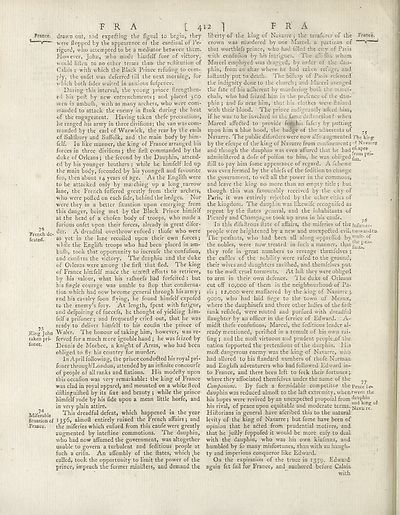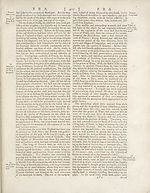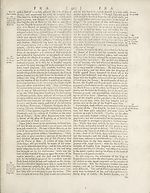Encyclopaedia Britannica > Volume 7, ETM-GOA
(452) Page 412
Download files
Complete book:
Individual page:
Thumbnail gallery: Grid view | List view

FRA [4
France, drawn out, and expecting the fignal to begin, they
u*—> “■ were Hopped by the appearance of the cardinal of 1’e-
rigord, who attempted to be a mediator between them.
However, John, who made himfelf fure of viftory,
would liiten to no other terms than the reftitution of
Calais ; with which the Black Prince refufing to com¬
ply, the onfet was deferred till the next morning, for
which both hides waited in anxious fufpence.
During this interval, the young prince ilrengthen-
cd his poll by new entrenchments ; and placed 3C0
men in ambulh, with as many archers, who were com¬
manded to attack the enemy in flank during the heat
of the engagement. Having taken thefe precautions,
he ranged his army in three divifions; the van was com¬
manded by the earl of Warwick, the rear by the eatls
of Salifbury and Suffolk, and the main body by him¬
felf. In like manner, the king of France arranged his
forces in three divifions; the firft commanded by the
duke of Orleans; the fecond by the Dauphin, attend¬
ed by his younger brothers ; while he himfelf led up
the main body, feconded by his youngefl and favourite
fon, then about 14 years of age. As the Englifh were
to be attacked only by marching up a long ^narrow
lane, the French fuffered greatly from their atchers,
w ho were polled on each fide, behind the hedges. Nor
were they in a better fituation upon emerging from
this danger, being met by the Black Prince himfelf
at the head of a chofen body of troops, who made a
furious onfet upon their forces, already in great difor-
Frcnch de- ^er' ^ dreadful overthrow enfued : thofe who were
feated. as yet in the lane recoiled upon their own forces;
while the Englifh troops who had been placed in am-
bufli, took that opportunity to increafe the confufion,
and confirm the victory. The dauphin and the duke
of Orleans were among the firft that fled. The king
of France himfelf made the utmcfl efforts to retrieve,
by his valour, w’hat his rafhnefs had forfeited : but
his fingle courage w>as unable to flop that confterna-
tion which had now become general through his army;
and his cavalry foon flying, he found himfelf expofed
to the enemy’s fury. At length, fpent with fatigue,
and defpairing of fuccefs, he thought of yielding him¬
felf a prifoner; and frequently cried out, that he was
ready to deliver himfelf to his coufin the prince of
King John Wales. The honour of taking him, however, w as re¬
taken pri- ferved for a much more ignoble hand ; he was feized by
loner. Dennis de Morbec, a knight of Arras, who had been
obliged to fly his country for murder.
In April following, the prince conduced his royal pri¬
foner through’London, attended by an infinite concourfe
of people of all ranks and ftations. His modefty upon
this occafion was very remarkable: the king of France
was clad in yoyal apparel, and mounted on a white tteed
diftinguifhetl by its fize and beauty ; while the prince
himfelf rode by his fide upon a mean little horfe, and
in very plain attire.
Mifertble ^’his dreadful defeat, which happened in the year
fituation of 1356, almoft entirely ruined the French affairs; and
Trance. the miferies which enfued from this caufe were greatly
augmented by inteftine commotions. The dauphin,
who had now afiumed the government, was altogether
unable to govern a turbulent and feditious people at
fuch a crifis. An afiembly of the Hates, which Jie
called, took the opportunity to limit the power of the
prince, impeach the former miniHers, and demand the
12 ] FRA
liberty of the king of Navarre ; the treafurer of the France,
crown was murdered by one Marcel,- a partizan of
that w'orthlefs prince, who had filled the ciry of Paris
with confunon by his intrigues. The affi.ffiii whom
Marcel employed was dragged, by order of the dau¬
phin, from an altar where he had taken refuge, and
ihHantly put to death. The bifliop of Paris relented
the indignity done to the church; and Marcel avenged
the fate of his adherent by murdering both the nraret-
chals, who had feized him in the prefence of tire dau¬
phin ; and fo near him, that his clothes were ftained
with their blood. The prince indignantly alked him,
if he was to be involved in the fame ddtruction? when
Marcel affefted to provide fophis fafety by putting
upon him a blue hood, the badge of the adherents of
Navarre. The public diforders were now alfo augmented The king1
by the efcape of the king of Navarre from confinement; >f Navai re
and though the dauphin was even affured that he hadfftaPc*',
adminillered a dofe of poifon to him, he was obliged t>ri“
Hill to pay him fome appearance of regard. A fcheme
was even formed by the chiefs of the fedition to change
the government, to veil all the power in the commons,
and leave the king no more than an empty title; but
though this was favourably received by the city of
Paris, it was entirely rejetded by the other cities of
the kingdom. The dauphin was likewife rccognifed as
regent by the Hates general, and the inhabitants of
Picardy and Champagne took up arms in his caufe. ^
In this difaHrous Hate of affairs, the miferies of the [nfunec-
pcople were heightened by a new and unexpected evil* irons and ta.
The peafants, who had been all along oppreffed by.^“‘^ of
the nobles, were how treated in fuch a manner, thatj-”^6^
they rofe in 'great numbers to revenge themfelves ;
the cafiles of the nobility were rafed to the groundJ
their wives and daughters ravifhed, and themfelves put
to the m@H cruel torments. At laH they were obliged
to arm in their own defence. The duke of Orleans
cut off 10,000 of them in the neighbourhood-of Pa¬
ris ; 12,000 were mafiacred by the.king of Navarre p
9000, who had laid fiege to the town of Meaux,
where the dauphinefs and three other ladies of the fir Hr
rank refided, were routed and purfued with dreadful
flaughter by an officer in the fervice of Edward. A-
midH thefe confufions, Marcel, the feditious leader al¬
ready mentioned, perifhed in a tumult of his own raf¬
fing ; and the moft virtuous and prudent people.of the.
nation fupported the pretenfions of the dauphin. His
molt dangerous enemy was the king of Navarre, who
had allured to his Handard numbers of thofe Norman,
and Englifh adventurers who had followed Edward in¬
to France, and there been left to feek their fortunes;
where they affociated themfelves under the name of the ^
Companions. By fuch a formidable competitor the Peace!,e-
dauphin was reduced almofl to the lafl extremity,when tween the
his hopes were revived by an unexpected propofal from ^
his rival, of peace upon equitable and moderate terms. °
Hiltorians in general have aferibed this to the natural
levity of the king of Navarre ; but fome have been of
opinion that he aCted from prudential motives, and
that he juHly fuppofed it would be more eafy to deal
with the dauphin, who was his own kinfman, and
humbled by fo many misfortunes, than with an haugh¬
ty and imperious conqueror like Edward.
On the expiration of the truce in 1359, Edward
again fet fail for France, and anchored before Calais.
with
France, drawn out, and expecting the fignal to begin, they
u*—> “■ were Hopped by the appearance of the cardinal of 1’e-
rigord, who attempted to be a mediator between them.
However, John, who made himfelf fure of viftory,
would liiten to no other terms than the reftitution of
Calais ; with which the Black Prince refufing to com¬
ply, the onfet was deferred till the next morning, for
which both hides waited in anxious fufpence.
During this interval, the young prince ilrengthen-
cd his poll by new entrenchments ; and placed 3C0
men in ambulh, with as many archers, who were com¬
manded to attack the enemy in flank during the heat
of the engagement. Having taken thefe precautions,
he ranged his army in three divifions; the van was com¬
manded by the earl of Warwick, the rear by the eatls
of Salifbury and Suffolk, and the main body by him¬
felf. In like manner, the king of France arranged his
forces in three divifions; the firft commanded by the
duke of Orleans; the fecond by the Dauphin, attend¬
ed by his younger brothers ; while he himfelf led up
the main body, feconded by his youngefl and favourite
fon, then about 14 years of age. As the Englifh were
to be attacked only by marching up a long ^narrow
lane, the French fuffered greatly from their atchers,
w ho were polled on each fide, behind the hedges. Nor
were they in a better fituation upon emerging from
this danger, being met by the Black Prince himfelf
at the head of a chofen body of troops, who made a
furious onfet upon their forces, already in great difor-
Frcnch de- ^er' ^ dreadful overthrow enfued : thofe who were
feated. as yet in the lane recoiled upon their own forces;
while the Englifh troops who had been placed in am-
bufli, took that opportunity to increafe the confufion,
and confirm the victory. The dauphin and the duke
of Orleans were among the firft that fled. The king
of France himfelf made the utmcfl efforts to retrieve,
by his valour, w’hat his rafhnefs had forfeited : but
his fingle courage w>as unable to flop that confterna-
tion which had now become general through his army;
and his cavalry foon flying, he found himfelf expofed
to the enemy’s fury. At length, fpent with fatigue,
and defpairing of fuccefs, he thought of yielding him¬
felf a prifoner; and frequently cried out, that he was
ready to deliver himfelf to his coufin the prince of
King John Wales. The honour of taking him, however, w as re¬
taken pri- ferved for a much more ignoble hand ; he was feized by
loner. Dennis de Morbec, a knight of Arras, who had been
obliged to fly his country for murder.
In April following, the prince conduced his royal pri¬
foner through’London, attended by an infinite concourfe
of people of all ranks and ftations. His modefty upon
this occafion was very remarkable: the king of France
was clad in yoyal apparel, and mounted on a white tteed
diftinguifhetl by its fize and beauty ; while the prince
himfelf rode by his fide upon a mean little horfe, and
in very plain attire.
Mifertble ^’his dreadful defeat, which happened in the year
fituation of 1356, almoft entirely ruined the French affairs; and
Trance. the miferies which enfued from this caufe were greatly
augmented by inteftine commotions. The dauphin,
who had now afiumed the government, was altogether
unable to govern a turbulent and feditious people at
fuch a crifis. An afiembly of the Hates, which Jie
called, took the opportunity to limit the power of the
prince, impeach the former miniHers, and demand the
12 ] FRA
liberty of the king of Navarre ; the treafurer of the France,
crown was murdered by one Marcel,- a partizan of
that w'orthlefs prince, who had filled the ciry of Paris
with confunon by his intrigues. The affi.ffiii whom
Marcel employed was dragged, by order of the dau¬
phin, from an altar where he had taken refuge, and
ihHantly put to death. The bifliop of Paris relented
the indignity done to the church; and Marcel avenged
the fate of his adherent by murdering both the nraret-
chals, who had feized him in the prefence of tire dau¬
phin ; and fo near him, that his clothes were ftained
with their blood. The prince indignantly alked him,
if he was to be involved in the fame ddtruction? when
Marcel affefted to provide fophis fafety by putting
upon him a blue hood, the badge of the adherents of
Navarre. The public diforders were now alfo augmented The king1
by the efcape of the king of Navarre from confinement; >f Navai re
and though the dauphin was even affured that he hadfftaPc*',
adminillered a dofe of poifon to him, he was obliged t>ri“
Hill to pay him fome appearance of regard. A fcheme
was even formed by the chiefs of the fedition to change
the government, to veil all the power in the commons,
and leave the king no more than an empty title; but
though this was favourably received by the city of
Paris, it was entirely rejetded by the other cities of
the kingdom. The dauphin was likewife rccognifed as
regent by the Hates general, and the inhabitants of
Picardy and Champagne took up arms in his caufe. ^
In this difaHrous Hate of affairs, the miferies of the [nfunec-
pcople were heightened by a new and unexpected evil* irons and ta.
The peafants, who had been all along oppreffed by.^“‘^ of
the nobles, were how treated in fuch a manner, thatj-”^6^
they rofe in 'great numbers to revenge themfelves ;
the cafiles of the nobility were rafed to the groundJ
their wives and daughters ravifhed, and themfelves put
to the m@H cruel torments. At laH they were obliged
to arm in their own defence. The duke of Orleans
cut off 10,000 of them in the neighbourhood-of Pa¬
ris ; 12,000 were mafiacred by the.king of Navarre p
9000, who had laid fiege to the town of Meaux,
where the dauphinefs and three other ladies of the fir Hr
rank refided, were routed and purfued with dreadful
flaughter by an officer in the fervice of Edward. A-
midH thefe confufions, Marcel, the feditious leader al¬
ready mentioned, perifhed in a tumult of his own raf¬
fing ; and the moft virtuous and prudent people.of the.
nation fupported the pretenfions of the dauphin. His
molt dangerous enemy was the king of Navarre, who
had allured to his Handard numbers of thofe Norman,
and Englifh adventurers who had followed Edward in¬
to France, and there been left to feek their fortunes;
where they affociated themfelves under the name of the ^
Companions. By fuch a formidable competitor the Peace!,e-
dauphin was reduced almofl to the lafl extremity,when tween the
his hopes were revived by an unexpected propofal from ^
his rival, of peace upon equitable and moderate terms. °
Hiltorians in general have aferibed this to the natural
levity of the king of Navarre ; but fome have been of
opinion that he aCted from prudential motives, and
that he juHly fuppofed it would be more eafy to deal
with the dauphin, who was his own kinfman, and
humbled by fo many misfortunes, than with an haugh¬
ty and imperious conqueror like Edward.
On the expiration of the truce in 1359, Edward
again fet fail for France, and anchored before Calais.
with
Set display mode to:
![]() Universal Viewer |
Universal Viewer | ![]() Mirador |
Large image | Transcription
Mirador |
Large image | Transcription
Images and transcriptions on this page, including medium image downloads, may be used under the Creative Commons Attribution 4.0 International Licence unless otherwise stated. ![]()
| Encyclopaedia Britannica > Encyclopaedia Britannica > Volume 7, ETM-GOA > (452) Page 412 |
|---|
| Permanent URL | https://digital.nls.uk/189127105 |
|---|
| Attribution and copyright: |
|
|---|
| Description | Ten editions of 'Encyclopaedia Britannica', issued from 1768-1903, in 231 volumes. Originally issued in 100 weekly parts (3 volumes) between 1768 and 1771 by publishers: Colin Macfarquhar and Andrew Bell (Edinburgh); editor: William Smellie: engraver: Andrew Bell. Expanded editions in the 19th century featured more volumes and contributions from leading experts in their fields. Managed and published in Edinburgh up to the 9th edition (25 volumes, from 1875-1889); the 10th edition (1902-1903) re-issued the 9th edition, with 11 supplementary volumes. |
|---|---|
| Additional NLS resources: |
|

